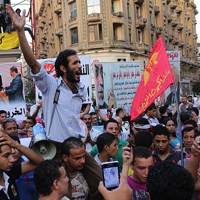On Wednesday, Gen. Abdel-Fattah El-Sisi, Egypt's military chief of staff, announced that the country's elected president, Mohammed Morsi, had been removed from office. Egypt's constitution will be suspended; Adly Mansour, the chief judge of the Constitutional Court, will temporarily assume the presidency and oversee a transitional government until new elections can be held at a date yet to be determined. The events of the "second Egyptian revolution" have effectively terminated the experiment as to whether the Muslim Brotherhood, having won parliamentary and presidential elections last year, would be able to construct a democratic regime. They now present the Obama administration with an unpleasant choice: to support an elected but illiberal leader or to accept a military coup d'etat in order to preserve the possibility of a secular, liberal Egypt.
History is no guide for finding a consistent answer to the dilemma that events in Egypt present. In Haiti, for instance, the United States opposed the 1991 ouster of Jean-Bertrand Aristide by the military due to his penchant for using authoritarian means for pushing reform—including efforts to bring the armed forces under firm civilian control—and helped restore him to his position in 1994. By contrast, in 2004, when Aristide was again pushed from office, the U.S. position, expressed by then-Secretary of State Colin Powell, was that Aristide "was democratically elected, but he did not democratically govern, or govern well." When it comes to Egypt and Morsi’s fate, there are signs that the Obama administration will lean toward the latter approach in crafting its response.
To some extent, the recent events in Egypt have rehabilitated the approach to political transformation that had been championed by Frank Wisner, who had served as Obama's personal envoy to Hosni Mubarak in an effort to negotiate a transition in January 2011. Wisner had focused his efforts on developing an orderly process for change, one that would have left Mubarak in place as a "lame duck" to finish out his term in office, while creating time to develop and implement new political rules of the game. Only then would matters be turned over to the people in the form of elections.

